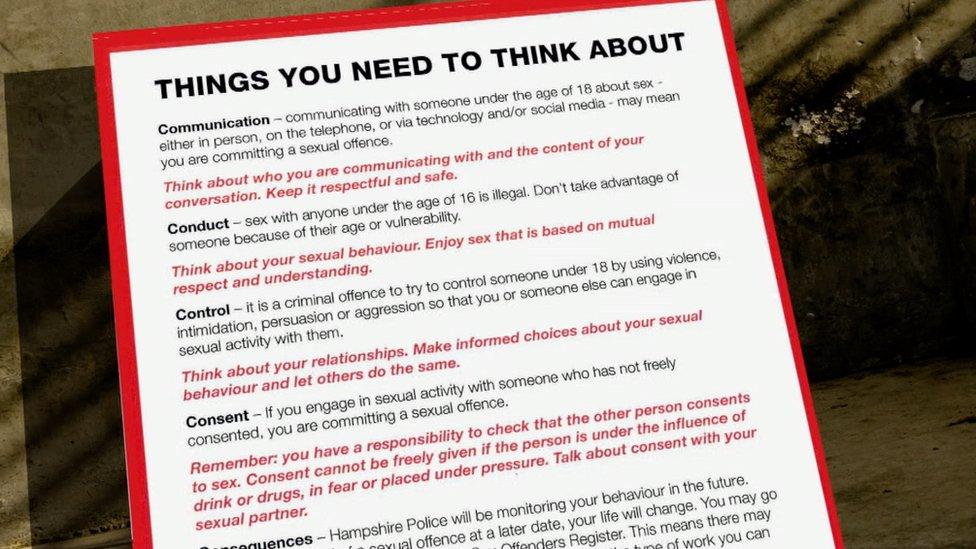Sex abuse leaflets 'won't protect a soul'
- Published

The C5 notices contain information about what constitutes a child sex offence
Police are giving leaflets to people at risk of committing child sexual exploitation crimes, asking for their behaviour to stop, the BBC has found.
The "C5 notices" - used by Hampshire Police when there is not enough evidence to charge - explain the law to recipients.
They can appear in an enhanced DBS check, which critics say risks penalising innocent people.
One Police and Crime Commissioner said it "won't protect a soul".
'Foot in the door'
The leaflets have been issued by Hampshire Police 54 times since their introduction in November 2016, the Victoria Derbyshire programme has learned.
A total of 52 were given to men with 34 handed to people aged 25 and under.
The force said the notices were used in cases where officers did not have enough evidence to charge a person with an offence, but were still concerned about their sexual behaviour. One example given was of a woman who was reported to police after 15 and 16-year-old boys were seen in her flat.

Sergeant Waghorn has personally handed out three C5 notices
Sergeant Antony Waghorn said officers, in delivering the notice to her, were able to educate her on the age of consent, giving them a "foot in the door... to go and speak to her and have a look around".
The woman has not come to police attention since being issued with the notice.
Labour MP Sarah Champion, co-chair of the All Party Parliamentary Group on Preventing Sexual Violence, said she was in favour of the initiative.
"What I'm hoping is, with Hampshire Police issuing these notices, it stops people in their tracks.
"That it makes them realise what they're doing - or what they're potentially thinking about - is a crime.
"That's the best way to protect children."
'Criminalisation by default'
A number of other police forces are also considering introducing the forms, the BBC understands.
But Police and Crime Commissioner Vera Baird, the national lead for child sexual abuse cases and a former barrister, told the Victoria Derbyshire programme she was worried the scheme "won't protect a soul" and would actually "put police off the scent" during an investigation.
"I don't know of anything else like this at all. There's nothing like a prospect of a conviction with this," she said.
"Cuts in budget and a vastly increased demand on policing are likely to have played a part [in its use]," she added.

Aine Kervick fears the notices could have long-term consequences for innocent people
Aine Kervick, a criminal defence lawyer at Kingsley Napley, said the notices were "criminalisation by default", which risked damaging people's rights.
The warning notice could show up in an enhanced DBS check - the type of background search carried out by employers for roles working with children.
"The employer of the future is not going to look behind it… they're just going to see that you've received a warning notice for child sexual exploitation and have serious concerns about your suitability", she said.
Hampshire Police denied the scheme was a cost-cutting measure, and said a warning notice would only be disclosed during a DBS check if it was relevant to the request.
The Home Office says it has made "£2.6 million of funding available to support the development of preventative schemes to complement existing statutory approaches".
Watch the BBC's Victoria Derbyshire programme on weekdays between 09:00 and 11:00 BST on BBC Two and the BBC News channel in the UK and on iPlayer afterwards.
- Published1 October 2018

- Published13 September 2018

- Published16 March 2018
